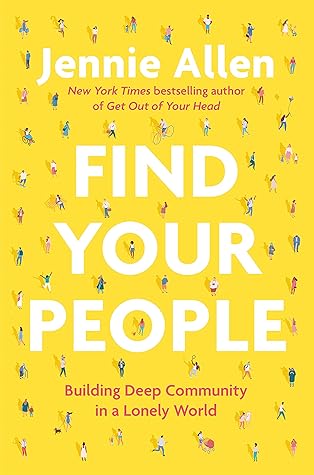More on this book
Community
Kindle Notes & Highlights
by
Jennie Allen
Read between
January 6 - January 23, 2023
Don’t sit on your rear end at home and try to make friends. Go do something. Teach Sunday school, volunteer at VBS, join a kickball team. What is something you can commit to for six months? That. Go do that and find some people to do it with you.
“True discipleship doesn’t happen out there; it happens in a home. True discipleship isn’t something you do once a week. It’s what you do every day because that’s when you get to know people.
It isn’t good for anyone to be alone and also isn’t good for man (or woman) to be idle! In the beginning and before the Fall, God gave us each other and then He gave us actual real-life, get-your-hands-dirty work to do.
Alone we want to escape or cope, but in community we help each other do hard things.
“Because the West is all about individualism, convenience, and being comfortable. Discipleship is inconvenient, uncomfortable, and very messy.”
together fight back against this individualistic culture that has intoxicated us into thinking that convenience and personal achievement equal happiness, because they don’t.
Conflict should make friendships, not break them. If we don’t run.
Conflict isn’t the enemy to our friendships; conflict is fodder to make them grow.
We must become people who come close. We must become people who engage. We must become people who choose to stay.
Without people pleasing, pride, and personal happiness at the center of our relationships, we live free enough to fight and humble enough to apologize and safe enough to work it out.
Conflict is safe when you know you won’t quit each other.
If we’re going to deal with an offense, it needs to be a real offense. This is my rule on when to address something: don’t react too quickly.
I will do what I can, but I can’t control that other person or make them tell me if something is upsetting them. I can’t force it to be okay. I can rest knowing I’ve done everything I can.
“He found that it took about 50 hours of interaction to move from acquaintance to casual friend, about 90 hours to move from casual friend to friend, and more than 200 hours to qualify as a best friend.”[5]
We give up so easily because it’s costly. It’s messy. It’s hard.
which to bury our tearstained faces. A friend. Our family would be there for us, and we would be there for them. This would not be a come-and-go arrangement but rather a covenant commitment.
But with family you don’t get to pick your people. Which means that most likely they won’t all be easy to love.
We all carry attachment issues into adulthood because we all have sinners for parents.
We love others in the manner in which we ourselves were loved.
Equally true: we tend to hurt others in the manner in which we ourselves have been hurt. The cycle perpetuates itself until something interrupts it and someone says, “Enough.”
Interestingly, some researchers assert that the happiest people are those who have the strongest fictive-kinship bonds: their own family was a disaster, so they went and formed a new one to call their own.
Confirmation bias works here too. If you expect to find beauty in your family relationships, you will find beauty. If you expect to find support, then you will find support. If you expect to find acceptance, then you will find acceptance.
So, of course, the most effective way for the enemy to stop the work of God on earth is to have us devour each other instead of celebrating each other and loving each other and serving each other and working together. This is why I care so much about developing deep, authentic, committed community.
Codependency develops when we look to other people to meet our needs instead of looking to God.
How do you know if you are in a codependent relationship? One sign is that you constantly feel discouraged and disappointed by the person. When you have an extreme reaction to something, you need to pay attention because it’s probably evidence of something or someone you’ve made into an idol. When you are unusually upset that a person didn’t call or that person wasn’t loving enough toward you or didn’t invite you to something, ask yourself, Am I putting unfair expectations on this person to meet my needs?
If you want to be effective, then ask for help. This makes other people feel needed, draws them together in a shared purpose.
It is a lie from the devil that we should be independent and self-sufficient!
If you have friends who are constantly talking with you about other people, let me tell you a little secret: when you’re not there, they’re talking about you!
But so often we end up so discouraged after our time with friends, having fixated on negative things rather than choosing to celebrate the good in others.
assume the best about each other and protect each other.
If a culture feels unsafe, then you have no place to thrive, no place to share your issues, your weaknesses, your failures. You have no place to be broken.
Assume people want to be your friend. Need things from others and assume they want to help! Ask people the questions you wish they’d ask you.


